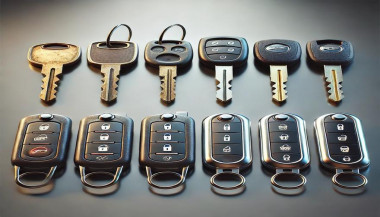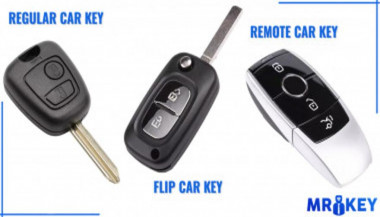When it comes to replacing a car key, knowing your key code is essential. This code allows you to obtain a precise duplicate, ensuring that your new key fits seamlessly without any issues. Whether you've lost your key, broken it, or simply need a spare, understanding where to locate this code can make the replacement process faster and more affordable. In this guide, we’ll walk you through what a key code is, where to find it, and tips to ensure a smooth replacement process.
Why Is the Key Code Important?
A key code is more than just a number; it's a unique identifier that tells a key cutter exactly how to replicate your key. Without it, the process can be longer, more complicated, and potentially costly if the key doesn’t match your vehicle’s lock.
- Ensures a Perfect Fit: The key code guarantees that your new key will be cut to match your original one precisely.
- Saves Time and Money: With the correct code, you can avoid trial and error, reducing the risk of needing multiple key replacements.
- Improves Security: Knowing the exact specifications of your key can prevent unauthorized duplicates.
Types of Key Codes
Key codes come in different types depending on the key and vehicle model. Here are the main types:
- Direct Code: Often a 4 to 8-digit code, this code can be entered directly into a key-cutting machine for accurate replication.
- Indirect Code: This type of code requires a conversion chart to find the direct key code. Though indirect codes aren’t as common, they may still appear on some older models.
- Blind Code: Sometimes, the code may not be directly readable or is hidden in the key's design. These require decoding using a specialized tool or software.
Understanding which type of code you have can make the process smoother when you’re ready to replace your key.
Common Locations for Key Codes
Finding the key code isn’t always straightforward, but with a few tips, you can track it down more easily. Here are the most common places to check:
1. Vehicle Manual
Your vehicle’s manual often contains useful information, including the key code. It’s usually found in the section detailing the vehicle’s locking system. The manual may also provide guidance on other important security features, so it’s a great place to start.
Tip: If you can’t find it in the manual, try looking in the index under “keys” or “security.”
2. Key Fob or Key Itself
For some keys, the code is printed directly on the key or key fob. Look closely at the metal part of the key or the plastic casing for a small series of numbers. This code may be faint, so you may need a magnifying glass or good lighting.
Tip: Be cautious when handling the key to avoid damaging the code. A worn key can sometimes obscure the code, so check carefully.
3. Vehicle Registration and Documents
Some vehicle documents, especially those you receive when you first purchase the car, may include the key code. Check any paperwork related to the purchase, including sales documents, registration, and the car title.
Tip: Keep these documents safe as they contain essential information for ownership and replacement needs.
4. Original Key Packaging
If you have access to the original packaging of the key, such as a bag or box, the key code is sometimes printed there. This is especially common if the key came from a dealer or as part of a new car purchase.
Tip: Always save key packaging, as it can provide helpful information for future reference.
5. Contacting the Dealership
If you’re unable to locate the code yourself, you can reach out to the dealership where you purchased the vehicle. Dealerships often keep records of key codes, especially if the vehicle is still under warranty. Some may provide the code for free, while others might charge a fee.
Tip: Have your vehicle identification number (VIN) handy when contacting the dealership, as it can help verify your ownership.
Tips for Safe Key Code Storage
Once you have located your key code, it’s important to keep it safe to make future replacements easier. Here are some tips:
- Store Digitally: Save the code in a secure document on your phone or computer. You can even use a password-protected note or cloud storage.
- Keep a Physical Copy: Write down the code and store it with other important vehicle documents, like your insurance and registration.
- Avoid Sharing the Code: Treat the key code like a password; only share it with trusted professionals when necessary for replacements.
What to Do if You Can’t Find the Code
If your search for the code has been unsuccessful, don’t worry—there are still options. Here’s what to do:
- Contact a Professional: Some professionals can create a new key by decoding the lock without needing the original key code. This is particularly helpful if you’ve lost all copies of your key.
- Request Assistance from the Manufacturer: In some cases, you can contact the vehicle’s manufacturer for support. They may ask for documentation proving ownership and might provide the code directly or guide you through the next steps.
Benefits of Knowing Your Key Code
Having the key code at your fingertips offers several advantages, whether you need a quick replacement or simply want peace of mind.
- Saves Time in Emergencies: If you lose your key unexpectedly, having the code handy allows for faster replacements.
- Lower Replacement Costs: With the exact code, key makers can avoid unnecessary recutting, saving you money.
- Simplifies Multiple Key Requests: If you need multiple copies, the code makes it easy to obtain several accurate replacements without errors.
Locating and safely storing your key code can simplify the replacement process significantly. By knowing exactly where to look for the code and keeping it secure, you can avoid potential stress and save both time and money when the need for a replacement arises. Taking these steps now ensures that, should you ever need a new key, the process will be as smooth and efficient as possible.

 (1)_1747918716.jpg)
_1736343521.jpg)


 (1)_1736339630.jpg)